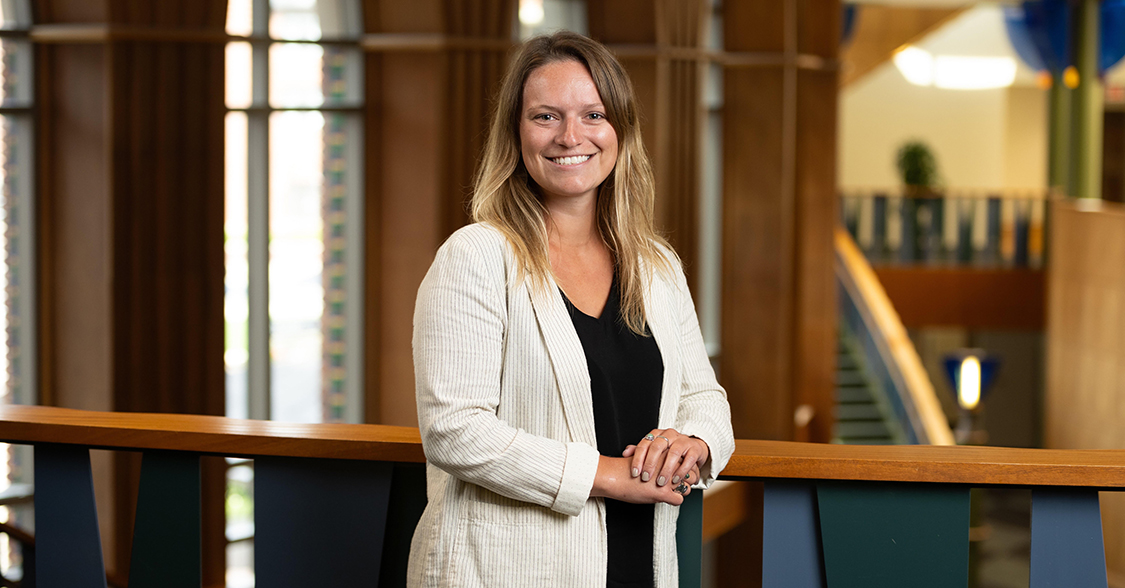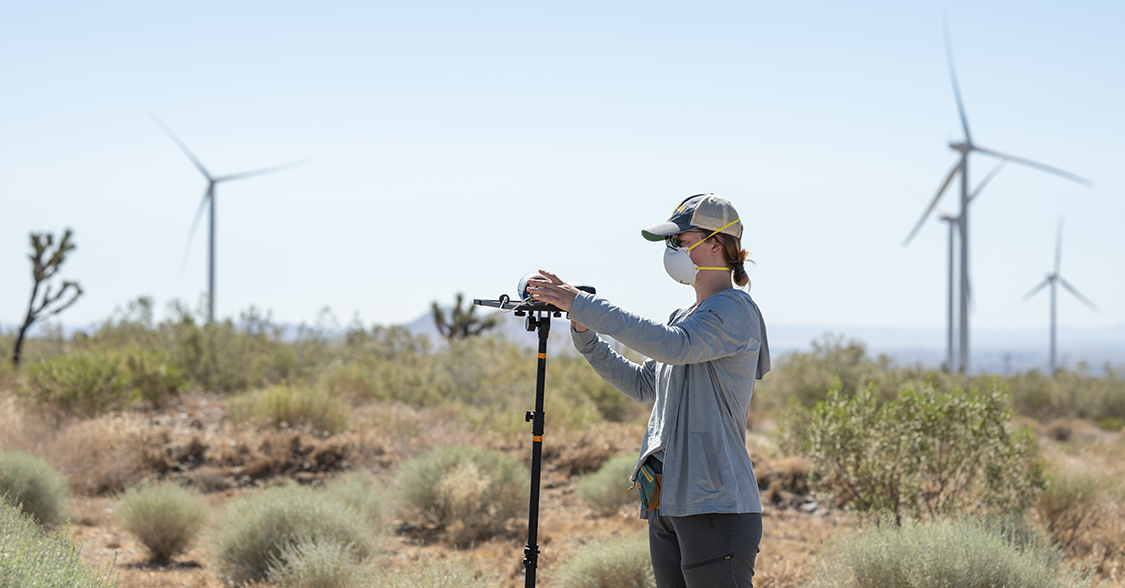Passionate about public health and fighting climate change

Sarah Dobson, MPH ’24
Epidemiology
Sarah Dobson, MPH ’24, discovered her interest in public health during an undergraduate population health class at James Madison University in Virginia, inspired by the “upstream-downstream” analogy and the predictive nature of zip codes on health outcomes.
“I was moved by the fact that someone’s zip code is a predictor of their health and was immediately drawn to wanting to learn more about the root causes of health outcomes and inequities,” said Dobson, who earned a Master of Public Health in Epidemiology from the University of Michigan School of Public Health.
After earning her bachelor’s degree in Health Sciences with a concentration in Public Health Education, Dobson, a native of Bel Air, Maryland, started her career just before the COVID-19 pandemic as an AmeriCorps VISTA in Bozeman, Montana. There, she engaged with community partners to address key chronic disease and behavioral health needs and supported various COVID-19 response efforts, including working closely with long-term care facilities and serving as a case manager.
The challenges of 2020 were significant but reaffirmed her dedication to the field.
“This experience taught me valuable lessons about resilience and reaffirmed that working in public health was where I was supposed to be,” Dobson said.
I find the relationship between climate change and health outcomes to be most interesting and motivating.”
— Sarah Dobson
LEARN MORE about Michigan Public Health.
Her passion for epidemiology, supported by her growing commitment to using reliable data to solve public health problems, was cultivated through various internships and the invaluable advice of her mentors. Dobson’s first introduction to epidemiology came when she interned with the Disease and Epidemiology Division of the US Army Public Health Center during undergraduate studies.
Pursuing an MPH at Michigan Public Health, coupled with a certificate in Social Epidemiology, allowed Dobson to delve deeper into the field. Dobson’s fascination with the intersection of climate change and public health drove her academic and professional endeavors.
“I find the relationship between climate change and health outcomes to be most interesting and motivating,” she said.

A high point for Dobson was working with Jennifer Head, assistant professor of Epidemiology, an experience that solidified her research skills, pushing her out of her comfort zone and providing her with significant public health research exposure.
Head, who studies the impact of climate change on infectious diseases, uses mathematical and statistical models to understand the transmission dynamics of these diseases. Aiming to uncover the complexities of pathogens such as Coccidioides that cause Valley fever, her research contributes to the broader understanding of how environmental changes influence disease spread and public health outcomes.
“Sarah was critical to the success of the research,” Head said of the project conducted in collaboration with the EPA, University of Idaho and University of California, Berkeley. “Working with Sarah was one of the highlights of my first year as an assistant professor at Michigan Public Health. She had contacted me as someone who was interested in pursuing climate and health and, at the time, there was a unique opportunity to involve a master’s student in managing a new project.”
Head’s team sought to test a novel sampling approach—air samples affixed to drones—to understand how human-pathogenic fungal spores were being aerosolized and transported. One of the project’s goals was to determine whether specific dust or dust-generating events such as wildfires were associated with pathogenic spore dispersal.
As part of Dobson’s integrated learning experience, she managed the data collection process during two field research trips to California and designed the mobile survey tool used to collect the data. She also analyzed spatial data and developed visualizations using R scripts and drafted a scientific manuscript. Dobson then presented her work at a conference at the University of California, Davis, on the impacts of dust on climate, the environment and human health.
“It was such a valuable experience to gain hands-on public health research experience,” Dobson said of working with Head.
READ MORE about faculty, students, alumni and staff.
Sarah was critical to the success of the research. Working with Sarah was one of the highlights of my first year as an assistant professor at Michigan Public Health. She had contacted me as someone who was interested in pursuing climate and health and, at the time, there was a unique opportunity to involve a master’s student in managing a new project.”
— Jennifer Head
She also was a student intern with MI-CARES, an environmental health and cancer research study funded through a $13 million grant from the National Cancer Institute.
MI-CARES, or Michigan Cancer and Research on the Environment Study, provided Dobson with valuable experience in epidemiological research, focusing on the links between environmental exposures and cancer risks. This opportunity allowed her to collaborate on impactful studies, enhance her data analysis skills and engage with community outreach initiatives—all of which are essential for her future career in public health.
Also while at Michigan Public Health, Dobson leveraged the strength of the entire university to deepen her knowledge of the connection between climate and health. She took courses from the School for Environment and Sustainability (SEAS), attended talks on environmental justice from visiting authors, and was in attendance for US Secretary of the Interior Deb Haaland’s talk during a speaker series hosted by SEAS.
Now, as an Oak Ridge Institute for Science and Education (ORISE) Fellow at the Centers for Disease Control and Prevention in Atlanta, Dobson is involved in supporting state and local health departments with emergency preparedness and response efforts.
The ORISE Fellowship is providing Dobson with applied research experience and professional development opportunities, helping her apply her epidemiology skills to real-world public health challenges. By working closely with experienced scientists and participating in critical projects, she is gaining valuable insights and technical expertise that enhance her career prospects and prepare her for future leadership roles in public health.
SUPPORT research and engaged learning at Michigan Public Health.
Her future aspirations include working at the federal level to enhance community preparedness for public health emergencies and addressing the impacts of climate change.
She aims to engage more in policy advocacy to improve health outcomes on a larger scale.
“I hope that this fellowship experience opens the door to career opportunities at the federal level,” Dobson said, “where I can continue to apply my skills and training in epidemiology.”
